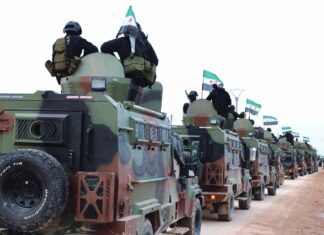
Few relationships in the Middle East have endured as many shocks as that between Damascus and Moscow. Born nearly a century ago in the ashes of colonial withdrawal, hardened through Cold War rivalry with the West, and tested by the Syrian Revolution, it now stands at another crossroads. The fall of Bashar al-Assad in 2024 did not end Russia’s role in Syria—it simply changed the terms of engagement.
Old Allies and New Realities
Mahmoud Othman, Berlin-based Human rights activist and political researcher, told Levant24 (L24), the roots of Syrian-Russian cooperation reach back to the final years of World War II, when the Soviets were among the first to recognize Syria’s sovereignty. “The beginnings were in July 1944, when [Russia] established diplomatic relations with the First Syrian Republic, even before its formal independence in 1946.”
The Suez Crisis, evolving the invasion of Egypt by an Israeli, British, and French coalition, sent shock-waves throughout the region, and as Syria, Middle East politics analyst Aron Lund wrote, “Syria sought foreign assistance against Israel and could not find it in the West.” The 1956 Syrian–Czech arms deal, brokered under Soviet supervision, ignited a defense relationship that endured until Assad’s fall.

That relationship deepened after the 1963 Ba’athist coup and was reshaped by Hafez al-Assad’s rise to power in 1970. Assad abandoned ideological dependence for a more calculated partnership, exploiting Soviet anxieties in the region to secure weapons and aid.
In 1980, the Treaty of Friendship and Cooperation formalized this strategic bond, granting the USSR access to the Mediterranean via naval facilities at Tartus while guaranteeing Syria a reliable flow of arms and economic aid.
Even after the Soviet collapse in 1991, Russia preserved this legacy, maintaining military, technical support, and a steady presence, ensuring continuity in one of the region’s most durable alliances. The Cold War’s end saw the alliance fade, but by the early 2000s, Bashar al-Assad and Vladimir Putin revived it in shared opposition to US policy in Iraq.
Reversing the Revolution
When Syria’s Revolution erupted in 2011, Moscow again positioned itself as Damascus’s protector—vetoing UN resolutions and supplying arms. When revolutionary forces seemed on the verge of victory in 2015, Russia began its military intervention—featuring extensive airpower, military advisors, and private contractors—reversing the revolution’s momentum, securing key urban centers, and ultimately ensuring Assad’s survival.

Russia’s intervention came at an enormous humanitarian cost. Russian airstrikes flattened entire neighborhoods in Aleppo, Homs, and Idlib, resulting in tens of thousands of civilian deaths and widespread displacement. But as Lund noted, Russia’s stance “had less to do with any great love for the [Assad] regime than with political transformations of a higher order in Russia’s view of the West.” In other words, Syria became the stage on which Moscow asserted its global relevance.
A Relationship Built on Interests
Dr. Mahmoud al-Hamza, a Syrian university professor and political expert on Russian affairs, told L24 the current stage of Syrian-Russian relations is defined by national interests rather than ideology. “Syria entered a new phase,” he said, “The new government is a government that thinks for the country’s interest, for the national interest, every decision benefits Syria.”
Hamza emphasized that this methodology is, at its core, a pragmatic one, and it is what allows the current government to consider continuation with Russia despite its many crimes against Syrians. “People will not forget,” he stressed, “but this is on a different level—now we are protecting Syria as a sovereign state,” and that he posits requires the realization that Syria cannot rely solely on itself, and at this time the state is vulnerable and in need of allies, wherever they may be found.
Moscow’s Stakes, Damascus’s Strategy
For Russia, Syria remains a strategic prize: a Mediterranean foothold through its naval base in Tartous and air operations in Latakia. With sanctions choking reconstruction funds and Syrian institutions hollowed out by war, Russia can play a key role in reconstruction, both via its role in the UN to help overturn existing sanctions there and repatriations of sorts by contributing to the country’s reconstruction and rehabilitation.

Yet economic issues are not the sole hurdles. Security remains the most delicate dimension of the partnership. Israel’s continuing airstrikes on Syrian territory highlight Damascus’s vulnerability—and the limits of Russian protection. “Russia could play a role in the South, on the borders with Israel,” says Hamza, “it could coordinate the situation with Israel, because Russia has a strategic relationship with Israel.”
A Calculated New Chapter
Today, Syrian-Russian relations remain defined by post-war dependency—a partnership forged in survival, maintained through necessity, and sustained by mutual security and strategic imperative. Damascus seeks stability through diversified partnerships while Moscow strives to preserve influence without dominance.
With every venture, there are inherent risks, and the post-Assad revival of Russian relations is no different. Questions of Moscow’s sheltering of Assad and his inner circle, responsible for torturing, murdering, and disappearing thousands of Syrians and stealing billions of dollars, loom large in the minds of many Syrians.
Renewed sanctions from the West remain a possibility as friction between the US, EU, and Moscow mounts regarding perceived threats of an expansionist and aggressive Russia in Ukraine and beyond. Many uncertainties remain regarding the details of defense agreements and existing Russian bases, and the benefits or harms of renewing such versus seeking better arrangements or even partners.
Despite all of this, many consider revitalized Russian-Syrian relations as a net positive and a step in the right direction. “We consider this a victory for Syria,” notes Hamza, “a victory for a new Syria, and a rational Syrian policy aiming for balanced international relations and zero problems.”








